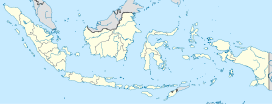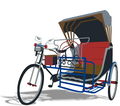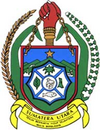Medan
| Medan | |||
|---|---|---|---|
|
|||
| Motto: Bekerja sama dan sama- sama bekerja (working together and worked together) | |||
 Medan
|
|||
| Coordinates: | |||
| Country | Indonesia | ||
| Province | North Sumatra | ||
| Founded | July 1, 1590 | ||
| Area | |||
| - Total | 265.10 km2 (102.4 sq mi) | ||
| Population (2010) | |||
| - Total | 2,109,330 | ||
| - Density | 7,957/km2 (20,608.5/sq mi) | ||
| Time zone | WIB (UTC+7) | ||
| Website | www.pemkomedan.go.id | ||
Medan (Indonesian: Kota Medan) is the capital of the province of North Sumatra, Indonesia. Located in the northern part of the province along the coast, Medan is the fourth largest city in Indonesia, as well as the largest city in the country which is not in Java. The city is bordered by Deli Serdang Regency to the east, south and west, and the Strait of Malacca to the north. It is close to the volcano Sinabung, which erupted from its 400 year dormant state in August 2010.
Medan is governed by a mayor, Drs. H. Abdillah Ak, MBA (period 2005-2010). Abdillah and his vice mayor is caught by Indonesian Corruption Eradication Commission at 2008. Then, Syamsul Arifin, the governor of North Sumatra appoints Affifudin Lubis become the acting mayor. In 2009, Affifudin Lubis resigns as mayor. The governor then appoints Rahudman Harahap become the mayor. Because Rahudman wants to be a candidate in the 2010 mayor election, he resigns as mayor. The current acting mayor is Syamsul Arifin, who is also the governor of North Sumatra. Medan is divided into 21 districts (kecamatan) and 151 subdistricts (kelurahan).
Contents |
History

Medan started as a village called Kampung Medan (Medan Village). Kampung Medan was founded by Guru Patimpus around the 1590s. Because Kampung Medan sits on Tanah Deli (Land of Deli), Kampung Medan is also referred as Medan-Deli. The original location of Kampung Medan is an area where the Deli River meets the Babura River.
Based on the diary of the Portuguese merchant in early 16th century, it stated that the name of Medan was actually derived from Medina which is actually a holy city in the western of Saudi Arabia. However, other sources indicated that the name of Medan actually came from Indian Hindi language word "Maidan" meaning "ground" or "land"(like in Pragati Maidan in Delhi). One of the Karo-Indonesia dictionary written by Darwin Prinst SH published in 2002 wrote that Medan could also be defined as "recover" or "be better".
The first inhabitants of Medan came from the Batak Karo community. It was not until the Sultan of Aceh, Sultan Iskandar Muda, sent his warlord, Gocah Pahlawan Laksamana Khoja Bintan, to be the Sultanate of Aceh's representative in Tanah Deli, that the Sultanate of Deli started to grow. This growth stimulated growth in both the population and culture of Medan. In the second year reign of Sultan Deli (between 1669-1698), there was a cavalry battle in Medan.
Medan did not experience significant development until the 1860s, when the Dutch colonialists began clearing the land for tobacco plantations. Medan quickly became a center of government and commercial activity, dominating development of Indonesia's western region.
The Dutch governed Tanah Deli from 1658, after Sultan Ismail, ruler of the Kingdom of Siak Sri Indrapura, yielded some of his once-ruled land, Deli, Langkat, and Serdang. In 1915 Medan officially became the capital of North Sumatra Province, and officially a city in 1918.
Currently much of Medans historic architecture from the colonial era is rapidly being demolished to make way for modern buildings (malls, garages, etc.)[1]
Demography
The city is Indonesia's fourth most populous after Jakarta, Surabaya, and Bandung, and Indonesia's largest city that is not on Java island. Much of the population lies outside its city limits, especially in Deli Serdang.
| Administrative division | Area (km²) | Population (2010 Census) | Population density (/km²) |
|---|---|---|---|
| Medan (Kota) | 265.1 | 2,109,330 | 7,959 |
| Binjai (Kota) | 90.2 | 246,010 | 2,726 |
| Deli Serdang Regency | 2,384.62 | 1,789,243 | 750.3 |
| Greater Medan | 2,739.92 | 4,144,583 | 1,512.8 |
The city has a mix of communities, reflecting its history. It is famous throughout Indonesia as the home of the Batak people, although, traditionally it is a Melayu Kampung. More recently more and more of the Batak ethnic minority have come to the city to make what was once a minority become a fairly sized community. However, Batak homelands are found throughout North Sumatra. In addition, there is a large ethnic Javanese community, largely made up of the descendants of people transported from Java in the last century as part of the government's transmigration policy, an attempt to relieve the chronic overcrowding of Java.
A highly visible component of Medan's population is the large number of Chinese, who are very active in the business sector, and unlike the ethnic Chinese in many other parts of Indonesia continue to speak Hokkien. Finally, the city has a sizable community of Tamil descent who are commonly known as keling. A well-known Tamil neighbourhood is Kampung Keling. In addition to Indonesian, Batak Simalungun, Batak Karo, Batak Mandailing, Batak Pak-Pak, Batak Angkola, Batak Toba, Deli Malay, Javanese, Hokkien (Min Nan), Tamil, Acehnese, Minangkabau and English are spoken.
Landmarks
There are many old buildings in Medan that still retain their Dutch architecture. These include the old City Hall, the central Post Office, the Tirtanadi Water Tower, which is Medan City's icon, and Titi Gantung (a bridge over the railway).
There are several historic places such as Maimun Palace (Istana Maimun) built in years 1887–1891, where the Sultan of Deli still lives (the Sultan no longer holds any official power), and the Great Mosque (Masjid Raya) of Medan built in 1906 in the Moroccan style by the Dutch architect Dingemans.[2]
Since 2005, a catholic temple, in Indo-Mogul style, devoted to Graha Maria Annai Velangkanni (Our Lady of Good Health), is built in Medan. This particular Saint knows its origin with an apparition in the 17th century in India. The temple is an imposant building, of two storeys and a small tower of seven storeys in Indonesian style, that already attracts attention from the main road (it is situated in the small road Jl. Sakura III besides Jl. Simatupang). It is already the second most important pilgrimage place in Asia.
Transportation
One of the unique features of Medan are the motorized becaks that are found almost everywhere. Unlike traditional becaks, a motorized becak can take its passenger anywhere in the city. The fare of riding a 'becak' is relatively cheap and is usually negotiated beforehand.
There are also more common transport like taxis and minibuses, known as sudako.
Railroad tracks connect Medan to Binjai and Tanjungpura to the northwest, to port of Belawan to the north, and to Tebing Tinggi and Pematang Siantar to the southeast.
The seaport of Belawan is about 20 km to the north. Polonia International Airport is located in the heart of the city. Kuala Namu International Airport is a new airport under construction and is due to replace Polonia in mid-2011.
A toll highway connects Medan to Belawan and Tanjungmorawa. A plan for the extension of this highway to Tebing Tinggi and to Binjai has been completed, and the central government is currently seeking investors to build the extension.
Education
Medan is home to a significant number of universities, colleges, and schools. The city government of Medan lists a total of 827 elementary schools, 337 junior high schools, 288 senior high schools, and 72 universities and other institutions of higher learning.[3]
State universities
| Name in English | Name in Indonesian | Acronym | Foundation | Link |
|---|---|---|---|---|
| State University of Medan | Universitas Negeri Medan | UNIMED | 1956 | [2] |
| University of Sumatera Utara | Universitas Sumatera Utara | USU | 1952 | [3] |
Private universities
| Name in English | Name in Indonesian | Acronym | Foundation | Link |
|---|---|---|---|---|
| Al-Azhar University | Universitas Al-Azhar | N/A | 1983 | [4] |
| Al-washliyah University | Universitas Al-washliyah | UNIVA | 1958 | [5] |
| Amir Hamzah University | Universitas Amir Hamzah | N/A | 1981 | N/A |
| Cut Nyak Dhien University | Universitas Cut Nyak Dhien | N/A | 1956 | N/A |
| Darma Agung University | Universitas Darma Agung | UDA | 1959 | [6] |
| Dharmawangsa University | Universitas Dharmawangsa | UNDHAR | 1986 | [7] |
| HKBP Nommensen University | Universitas HKBP Nommensen | UHN | 1954 | [8] |
| Social Development University of Indonesia | Universitas Pembinaan Masyarakat Indonesia | UPMI | 1979 | [9] |
| Islamic University of Sumatera Utara | Universitas Islam Sumatera Utara | UISU | 1952 | [10] |
| Medan Area University | Universitas Medan Area | UST | 1982 | [11] |
| Methodist University of Indonesia | Universitas Methodist Indonesia | UMI | 1965 | [12] |
| Muhammadiyah University of Sumatera Utara | Universitas Muhammadiyah Sumatera Utara | UMSU | 1957 | [13] |
| Nusantara Al-Wasliyah Muslim University | Universitas Muslim Nusantara Al-Wasliyah | UMN | 1996 | [14] |
| Pancabudi Development University | Universitas Pembangunan Panca Budi | UNPAB | 1964 | [15] |
| Preston University of Indonesia | Universitas Preston Indonesia | UPI | N/A | N/A |
| Prima University of Indonesia | Universitas Prima Indonesia | UNPRI | 2005 | [16] |
| Setia Budi Mandiri University | Universitas Setia Budi Mandiri | USBM | 2008 | [17] |
| Sisingamangaraja XII University | Universitas Sisingamangaraja XII | US XII | 1984 | N/A |
| Social Development University of Indonesia | Universitas Pembangunan Masyarakat Indonesia | UPMI | 1979 | [18] |
| St. Thomas Catholic University | Universitas Katolik Santo Thomas | UST | 1984 | [19] |
| Source: Directorate General of Higher Education, Ministry of National Education, Indonesia | ||||
Media
The TVRI Medan (state-owned) and Deli TV (private) are the only two local TV stations in Medan. Several local newspapers are running in the city with Harian Mimbar Umum as the oldest one. Other popular newspapers include Harian Waspada, Harian Analisa, Berita Sore, Harian Global, Harian Medan Bisnis, Posmetro Medan, and Suara Indonesia Baru
Sport
Football is one of the favorite sports, with two local clubs: PSMS Medan and Medan Jaya. Another locally popular sport is Wushu, with significant growth in recent years as one of the favorite sports in Medan. It has its training center in Plaju Street in heart of town. Medan has recently seen much success in Wushu nationally and internationally.
Pictures Gallery
 Kesawan in the 1920s |
 Tirtanadi Tower, Icon of Medan |
 Medan |
 Maimoon Palace, home of the Sultan of Deli |
 Medan at night |
 Medan skyline |
 The tricycle rickshaw (becak) |
Medan |
Sister cities
- Ichikawa, Japan
- George Town, Malaysia
- Chengdu, China
- Gwangju, South Korea
References
- ↑ Jakarta Post article 25-05-2010. [1]
- ↑ http://www.pac-nl.org/downloads/medanurbandevelopmentcp08.pdf
- ↑ City Government of Medan: Education in Medan
External links
- Medan travel guide from Wikitravel
- Official Government website (Indonesian)
- Medan Tourism (English)
- Local newspaper
- Harian Analisa - Medan & North Sumatera Newspaper (Indonesian)
- Harian Global - Medan & North Sumatera Newspaper (Indonesian)
- Harian Medan Bisnis - Medan Business Newspaper (Indonesian)
- Harian Waspada - Medan & North Sumatera Newspaper (Indonesian)
- Posmetro Medan - Medan, Pematang Siantar & North Sumatera Newspaper (Indonesian)
|
|||||||||||||||||

